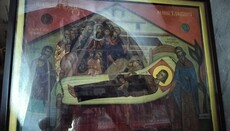Christians Shouldn't Valorize Ozzy Osbourne

Our tendency to idealize celebrities like Ozzy Osbourne who show vague signs of faith reflects an insecure desire for cultural relevance, but this risks sanitizing their harmful legacies and diluting the Gospel's truth for the sake of fleeting popularity.
There’s a peculiar habit among Christians, one that betrays a certain insecurity about our place in the modern world. We have a tendency to latch onto any celebrity who so much as glances in the direction of our faith, as if their fleeting interest validates our beliefs.
From Andy Warhol’s private piety to Shia LaBeouf’s much-publicized conversion to Kanye West’s gospel albums, we seize upon these figures with a fervor that borders on desperation. It’s as if their fame could somehow burnish the Gospel’s credibility, granting us a veneer of relevance in a culture that increasingly dismisses us as relics.
This chase for clout is a fool’s errand. And nowhere is this clearer than in the case of Ozzy Osbourne, a man whose legacy, despite any late-life gestures toward faith, remains steeped in darkness that Christians should not rationalize, much less idealize.
Osbourne—the self-styled “Prince of Darkness”—built his career on a persona that reveled in the macabre. As the frontman of Black Sabbath and later as a solo artist, he wove demonic themes into his music and public image. Songs like “Mr. Crowley,” which celebrates the infamous occultist Aleister Crowley, and “Suicide Solution,” which critics argued glamorized self-destruction, are not mere artistic provocations.
These songs shaped a cultural moment, particularly for impressionable youth in the 1970s and 1980s, when heavy metal was a pillar of Anglo-American counterculture. Osbourne’s antics (biting the head off a bat, desecrating the Alamo by urinating on its grounds, etc.) cemented his image as a figure who thrived on shock and defiance, often at the expense of anything resembling Christianity.
Yet, since his death, we’ve been treated to a deluge of articles praising Osbourne’s belief in Christ. He’s spoken vaguely of believing in God, of praying, of wrestling with his demons. Some Christians, eager for a redemption arc, point to these moments as evidence of a heart turning toward the light. They argue that we should celebrate his potential repentance. We should see Osbourne as a prodigal son, they say, rather than a purveyor of chaos.
This impulse, while rooted in charity, risks a dangerous oversight. It ignores the weight of Osbourne’s influence, which for decades eroded what little was left of Christian civilization. To idealize him because of a few ambiguous statements is to confuse hope with endorsement, to mistake our desire for his salvation with an obligation to sanitize his legacy.
This is where our bad habit comes into play. Christians have long been guilty of elevating celebrities who flirt with faith, as if their star power could bridge the gap between the Church and a secular world.
Andy Warhol, with his quiet Catholicism, was lionized by some as a tortured artist whose faith redeemed his eccentricities.
Shia LaBeouf’s embrace of traditional Catholicism has been hailed as a triumph, despite his volatile past.
Kanye West’s “Jesus Is King” was met with rapturous applause from believers, even as his behavior oscillated between messianic and erratic.
We’re drawn to these figures not just because of their potential redemption but because their fame makes us feel relevant. If a celebrity claims Christ, we think, maybe the world will take us seriously. Maybe we’ll make Christianity cool again.
But chasing cultural relevance through celebrity is a trap. It reduces the faith to a marketing ploy, a way to score points in a popularity contest we were never meant to win. When we valorize figures like Shia, Kanye, and Ozzy—whatever their virtues!—we risk diluting that truth. In Osbourne’s case, this means downplaying the impact of lyrics that toyed with Satanism or songs that, at their worst, were blamed for pushing troubled teens toward despair. A 1985 lawsuit alleged that “Suicide Solution” inspired a teenager’s suicide—a charge Osbourne denied, but one that underscores the weight of his influence. Art doesn’t exist in a vacuum; it shapes souls, for better or worse.
Let’s be clear. We should pray for Ozzy Osbourne, as we pray for all who struggle under the weight of their choices. We should pray that, in his private moments, Osbourne sought and found grace. Reports of his declining health in recent years only deepen this call to compassion.
Still, compassion is not the same as adulation. To idealize Osbourne is to ignore the harm his work caused, particularly to a generation of young people who found in his music a soundtrack for rebellion and nihilism. His flirtations with the occult, even if theatrical, gave a kind of permission to dabble in darkness. Christians cannot rewrite this history to fit a narrative of redemption that may or may not be true–especially not if it means overlooking the real harm that figures like Osbourne did, not only to himself, but to so many of his friends and neighbors.
The temptation to idolize figures like Osbourne stems from our discomfort with being countercultural. We want to be liked, to be seen as players in the cultural game. But Christianity was never meant to be popular. Christ himself warned us: “If the world hates you, know that it has hated me before it hated you” (John 15:18). Our task is not to court the world’s approval but to bear witness to the truth, even when it’s unfashionable. Clinging to celebrities who flirt with faith doesn’t make us relevant; it makes us look desperate. It suggests we’re more interested in headlines than holiness.
Instead of chasing clout, we should focus on the quiet, unglamorous work of living out the Gospel. That means praying for Osbourne’s soul, yes, but also acknowledging the damage his legacy wrought.
The Church has endured for two millennia not because it courted fame but because it clung to the Cross. Let’s not trade that for a fleeting moment in the spotlight.









